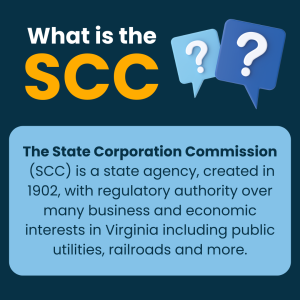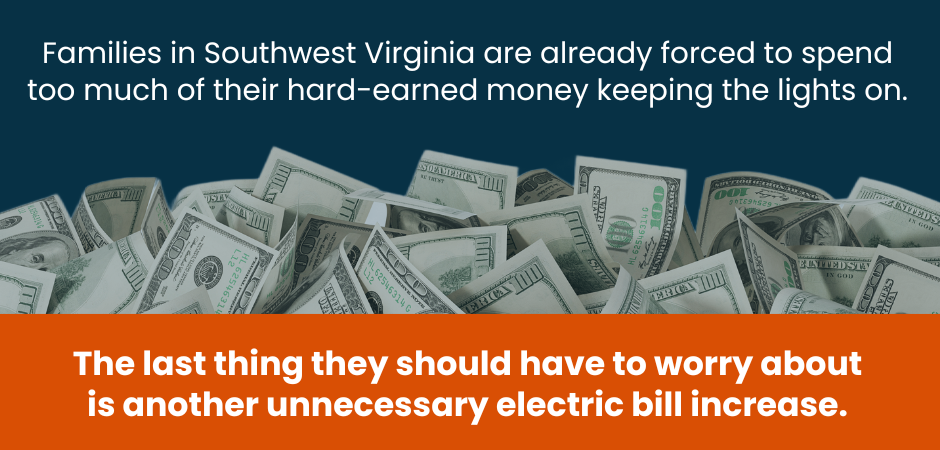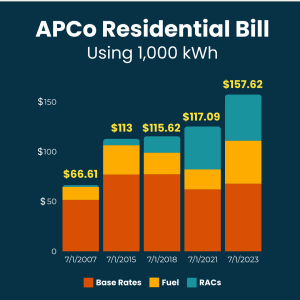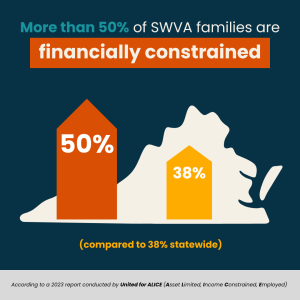WHAT to know about APCO’s 2024 rate case…
and how it will impact your electric bill
By: Amy Waters, Clean Virginia Communications Manager
While hardworking families are fighting to keep cool in the extreme heat, Appalachian Power Company is fighting for an extreme profit increase that will have you and your wallet sweating it.
As Virginia’s second largest state-regulated electric utility monopoly, with territory covering parts of southern Virginia and most of Southwest Virginia, Appalachian Power Company (APCo) should operate in the public interest – but the utility’s latest move does the opposite, prioritizing shareholders over customers.
In March 2024, APCo filed its biennial rate review application with the State Corporation Commission (SCC). Based on the utility’s projected expenses and its claim that it should earn more profit, APCo requested an annual base rate increase of approximately $95 million. If approved, this will raise hundreds of thousands of residential customers’ bills by ~$10.22 a month (or $123 a year).
bills are already spiking in apco’s territory
APCo has already increased its customers’ bills more than once in the last year, including a $16 per month increase that took effect in January 2024. In fact, APCo customers have seen their power bills increase by over $100 a month since 2007.
In addition to rate increases from the utility, bills are also predicted to spike this summer because of record-breaking temperatures. Electric customers can expect to pay an average of $792 on electricity between June and September this year, a $58 jump from last summer.
Image Source: Source: State Corporation Commission Report, pg. 7
energy costs hit harder in southwest virginia
Virginians pay some of the highest electric bills in the country, according to the U.S. Energy Information Administration, but for low-income families those costs are a heavier burden.
Low-income Virginia households spend 14% of their income on energy costs on average. Rising power bills have serious impacts on those families, who will be more likely to experience power shutoffs and dangerous heat exposure.
In August 2022 alone, there were over 26,000 utility shutoffs in Virginia. Seniors, infants and people with medical conditions or disabilities are most vulnerable when the power is shut off because they face serious health risks in extreme temperature conditions.
With more than 50% of Southwest Virginia families facing financial constraints, it should come as no surprise that a bill increase of this size will harm families, forcing tough choices between keeping the lights on or paying for other necessities like food, rent and healthcare.
how apco’s rates are set
 The State Corporation Commission (SCC) is responsible for determining a utility’s base rate, which must be set at a level high enough to ensure that its operating costs are covered and that its shareholders receive a fair profit.
The State Corporation Commission (SCC) is responsible for determining a utility’s base rate, which must be set at a level high enough to ensure that its operating costs are covered and that its shareholders receive a fair profit.
The base rate includes the following costs:
- Maintaining infrastructure (electricity generation, transmission and distribution)
- Authorized profit earnings from capital investments (including building new gas plants and solar farms); APCo is currently authorized by the SCC to earn a 9.5% profit on its capital investments
- General operating expenses (such as salaries for employees)
The formal review of a utility’s base rate application is known as a rate case. During a rate case, the SCC conducts an in-depth analysis of an electric utility’s costs and revenues over a set time period. For APCo, that period is the two years preceding each rate case.*
*APCo was previously required to submit its rate review application every three years. The review period became biennial after the 2023 legislative session with the passage of HB 1777 and its companion bill SB 1075. As a result, APCo’s current rate case only covers the 2023 calendar year.
APCO’S LATEST REQUEST IS UNPRECEDENTED
APCo submitted its biennial rate review application to the SCC on March 29th of this year, requesting an annual base rate increase of ~$95 million. This includes an increase to the utility’s authorized profit level, or rate of return on common equity (“ROE”).
Almost $40 million of the proposed $95 million rate increase comes from APCo’s request for a higher ROE. Notably, APCo’s profit level was increased in the fall of 2023 to 9.5%; the utility’s current application requests an even higher ROE of 10.8%. It argues this significant increase is necessary because of higher vegetation management expenses, carrying costs on deferred fuel balances and increased operations and maintenance expenses.
Although utilities are allowed to ask for ROE adjustments based on new market conditions, APCo’s latest request is unprecedented.
The SCC typically adheres to the concept of “gradualism” when considering rate changes. Incremental rate changes allow the utility to adjust their costs and behavior more smoothly in the event of a rate decrease and lessen the social impact on vulnerable groups, such as low-income households, by giving more time to adapt to rising bills in the event of a rate increase.
In this case, however, the utility is requesting a very large increase in its authorized profit level just months after its latest bump in profits.
a breakdown of apco’s 2024 rate case
Between now and September, the SCC will hear statements and expert testimonies from the Office of the Attorney General, consumer and environmental advocates, associations and companies, and the public to make several major determinations:
Backward analysis:
The SCC will determine APCo’s cost of service and earnings for the review period and determine whether it earned above or below its current authorized ROE of 9.5%. If it determines that APCo earned more than 1% above its approved ROE, it will order APCo to fully refund customers for all earnings above that 1% margin.
Forward analysis:
The SCC will determine the profit (or ROE) that APCo is allowed to earn in the future. Currently it is 9.5%. APCo is requesting that this number increase to 10.8%.
The SCC will also determine whether APCo’s rates should be increased or decreased from their current level, based on the amount that will allow the company to cover its costs and approved profits over the next two years.

HERE’S WHAT YOU CAN DO:
- Sign the petition asking state regulators to DENY APCo’s request for a rate increase and to put Virginians over utility profits.
- Submit your own written comment to the SCC by September 4th. Scroll down to case number PUR-2024-00024, then select “Submit Comments.”
- Complete a public witness form to publicly testify at the hearing (via webcast) on September 9th. Scroll down to case number PUR-2024-00024 for directions on registering to speak. (Public witnesses intending to provide oral testimony must pre-register with the SCC by 5 p.m. on September 4th.)
- Sign up for Clean Virginia’s mailing list to stay up to date on the case and receive information about new ways to take action.
- Connect directly with a Clean Virginia team member at [email protected] to learn more and for opportunities to get more involved in this campaign.

